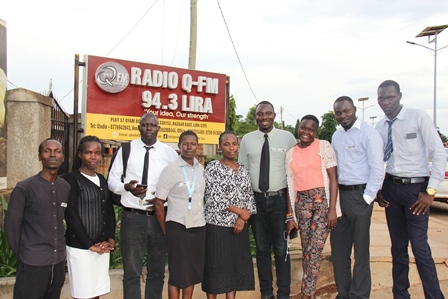
 Mama FM
Mama FM

 Mama FM
Mama FM
19 May 2025, 9:40 pm
By Catherine Apalat
The Uganda Media Women’s Association (UMWA) has successfully concluded a series of onsite gender learning visits across five districts in Northern Uganda. They are: Lira, Amolatar, Pader, Apac, and Gulu. These visits were aimed at promoting gender-sensitive reporting and equipping local media houses with tools to amplify women’s voices in their content.
According to UMWA’s Project Coordinator, Catherine Apalat, the onsite training was designed to engage media managers, editors, and owners who often miss out on physical or virtual training sessions due to their busy schedules. “We brought the training closer to the people who shape newsroom decisions, so they can take the lead in mainstreaming gender in their reporting and media practices,” she said.
UMWA is implementing a one-year project, “Women in Media” in partnership with the Finnish Foundation for Media and Development (VIKES). The goal of the project is: Media organizations provide diverse and inclusive reporting and quality journalism that reach wider audiences, including marginalized groups and Gender equality is mainstreamed in the policies and practices of media organizations. The one-year project is implemented in Northern Uganda and Kampala. The project targets community radio journalists, mainstream journalists in Kampala, media managers, editors and owners.
A 2022 UMWA and the Global Media Monitoring Project study shows that women only make up 28% of news sources in Ugandan media an improvement from 24% in 2020, but still far from ideal. Additionally, female journalists face increasing levels of harassment—both online and offline—from colleagues, powerful figures, and even the public. These challenges often force many women to leave the profession.
The training also aimed to equip journalists with practical skills to report ethically, amplify the voices of marginalized groups—especially women—and address sexual harassment in the workplace.
As part of the initiative, UMWA provided each participating media house with partnership agreements and a gender-sensitive scorecard. Doreen Sampa, UMWA Advocacy Officer emphasized that the tools are designed to strengthen the commitment of media houses to mainstream gender in their editorial content, newsroom practices, and organizational policies. “The agreements serve as a formal pledge, while the scorecards help assess and track progress towards gender inclusivity” she said.
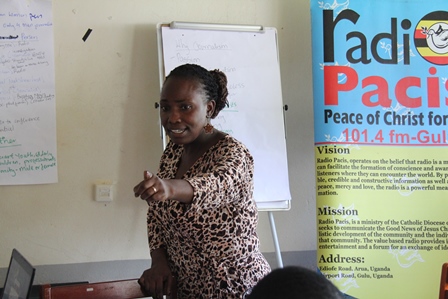
“Journalists in rural areas are often left out of trainings due to limited staffing and location of the radio station. This onsite approach ensures they are not left behind,” Catherine Apalat.
The onsite visits targeted eight media houses and eight media practitioners per media house. The community radio stations were: Radio Wa and Q FM in lira district, Hot FM in Amolatar district, Radio Apac in Apac district, Rapa FM and Luo FM in Pader and Speak and Radio Pacis in Gulu district. Training sessions in the media houses covered gender sensitive reporting, the power and role of media in amplifying voices of the marginalized in society, human rights laws and gender frameworks and sexual harassment prevention and response.
Sixty-nine (69) media practitioners, both male (44) and female (25), participated in the training. They included, news reporters, editors, programs manager, Managers, Head of news, Administration, producers and sub editors.
Participants from various media houses expressed how the training impacted their perspectives and reporting approaches.
Lawino Gladys, a news anchor and reporter at Rapa FM, shared her renewed commitment to inclusive journalism.
“With the skills I’ve gained, I am now poised to rewrite the narrative. I will ensure that gender inclusivity becomes a central pillar in my stories and encourage more women in my community to raise their voices in the media,” she said.
For many, this was the first training of its kind.
“This is the first time an organization has made such an initiative to come to us where we work and impart such great, wonderful knowledge and skills. Before, most organizations engaged only with females on gender issues, leaving out male journalists,” said Joseph Okul, Head of News and Reporters at Q FM Lira.
Patricia Alany, a presenter at Q FM, expressed her new sense of responsibility:
“I am going to be intentional in highlighting both men and women’s voices in stories and ensure there is a balance in our content. I will also speak up against improper behavior at my workplace in case of sexual harassment.”
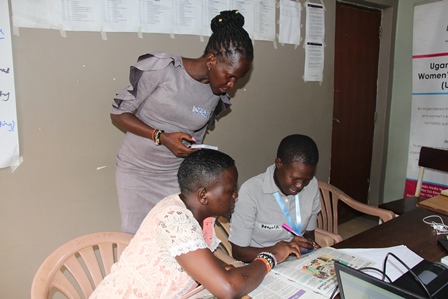
At Radio Apac, staff embraced the lessons learned.
“I am going to ensure that my reporting is changed by considering more women in my news stories. I will also encourage female journalists to speak up and report any sexual harassment they experience while at work,” shared Abili Isaac Newton, the Editor.
Reporter Odongo Samuel added, “I am going to start prioritizing women’s stories and include laws, articles, and policies in my news stories. This training has given me a clear picture of what sexual harassment is and the different forms. I have also learnt how to address it.”
Keneth Ongom, the Station Manager, committed to action: “We shall start speaking up, creating safe places and making it known to staff that sexual harassment has devastating effects on journalists, especially females. We shall also make the policy known to the rest of the staff through orienting them.”
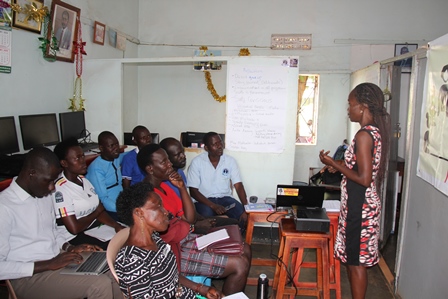
Managers at Hot FM Amolatar also welcomed the training.
“Sexual harassment and gender responsive reporting are key to Hot FM. It is going to help us change our attitude and behavior. We are excited about the partnership with UMWA and will take advantage to improve our practices,” said Denis Olaka, the Station Manager.
Amongi Desire Ocen, the Programs Manager, emphasized, “Sexual harassment is a big issue, yet we are slow to act on it. This has forced women to remain silent. We shall put in place a guideline and also a policy that protects women from sexual harassment.”
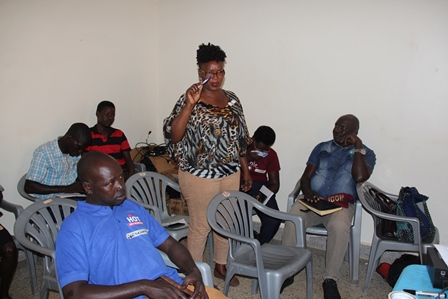
From Rapa FM, News Editor Ekul Bonny Daniel stated:
“As the news editor, I will ensure I balance my news stories before broadcasting on air and ensure women are interviewed as news sources. I will also start assigning female journalists to the field just like the male counterparts.”
Programs Manager Odongo James Patrick shared plans to deepen programming:
“From this training, I plan to allocate a weekly one-hour program that specially handles issues affecting women we usually tend to ignore—like gender-based violence and domestic violence.”
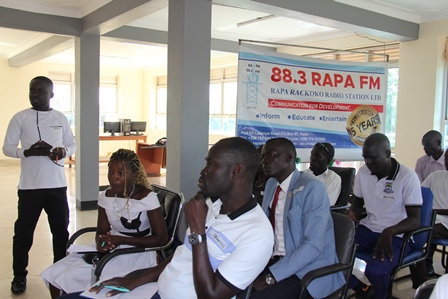
At Luo FM in Pader, Daniel Comboni, News Editor, reflected on the impact of the training:
“I will increase the number of women sources in the news stories I edit. I will improve the language I use while on air, avoid stereotypes, and address men and women in their rightful capacities.”
Reporter Geoffrey Okwong added:
“I am going to deliberately include women’s voices in my stories. I will also read widely about the laws that compel me as a journalist to report gender sensitively, like the Maputo Protocol, CEDAW, and the National Constitution.”
At Speak FM in Gulu, the lessons were well received.
“The training has given me the skills and knowledge to improve as a reporter with a gender lens that includes both men and women’s views and opinions in my news stories,” said Okello Gift, a reporter.
Editor Joyce Adokorach emphasized consistency:
“Though Speak FM advocates for gender equality, this training has been a great reminder for us to be consistent in ensuring we include more voices of the marginalized, especially women, youth, and children.”
At Radio Pacis Gulu, Alimocan Desire, a reporter, said:
“The training has challenged me to be an ear to the ground in my community by looking out for issues affecting the most vulnerable like women. This will improve my reporting and help advocate for fair treatment for both men and women.”
Okello Peter, a Programs Producer, added:
“In my department, I am going to closely follow issues of gender-responsive programming and identify new ideas that include more participation of women in our community.”
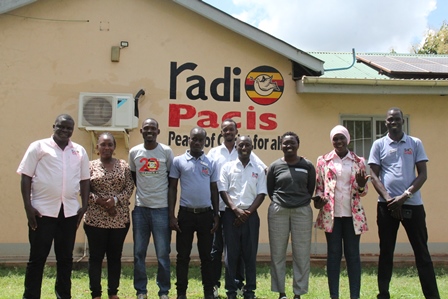
These commitments show the potential for real transformation in Uganda’s media where gender equality is not just a policy but a practice.